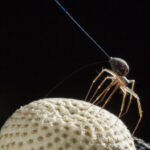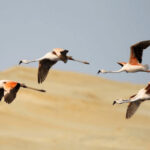Summer days by the pool should be relaxing, but the persistent buzzing and biting of horse flies can quickly turn tranquility into irritation. These robust insects have an uncanny knack for finding their way to our pools, leaving swimmers swatting and frustrated. To reclaim your poolside peace, it’s crucial to understand what exactly draws horse flies to your pool area and, more importantly, how to deter them effectively.
Decoding the Horse Fly Attraction to Pools
Horse flies, belonging to the Tabanidae family, aren’t just randomly buzzing around your pool. They are attracted for specific reasons, many of which are linked to their survival and breeding needs. Several key factors make pools irresistible to these summertime nuisances.
One of the primary attractants is the unique cocktail of scents emanating from pool water. This isn’t just about the clean, refreshing water we enjoy; for horse flies, it’s a chemical signal. Pool water often contains chlorine, along with sweat, and natural skin oils shed by swimmers. This combination creates a scent profile that horse flies find highly appealing.
Alt: Horse fly resting on a green leaf, showcasing its large eyes and robust body, commonly found near water sources.
Horse flies are inherently drawn to moisture, as water sources are essential for their life cycle. Female horse flies, in particular, require protein from blood meals to develop their eggs, and they need a suitable moist environment to lay those eggs. Pools, with their large surface area of water, present themselves as ideal breeding grounds in the eyes of a horse fly.
Furthermore, the visual aspect of a pool also plays a significant role in attracting horse flies. The movement of water and the reflection of sunlight off the pool’s surface create visual cues that mimic the appearance of prey or water bodies in nature. Horse flies, with their keen eyesight, are drawn to these shimmering reflections, mistaking them for potential targets or essential resources. This combination of olfactory and visual stimuli makes pools highly attractive destinations for horse flies, unfortunately disrupting our poolside enjoyment.
Unpacking the Scents That Lure Horse Flies
To effectively manage horse flies around your pool, it’s vital to pinpoint the specific smells that act as powerful attractants. By understanding these scent triggers, we can take targeted steps to minimize their allure. The main scents that draw horse flies to pools include:
The Chemical Call of Chlorine
Chlorine is indispensable for maintaining pool hygiene, but its distinctive odor can inadvertently attract horse flies. While we associate chlorine with cleanliness, horse flies are drawn to the chemical compounds present in treated water. They seem to interpret the scent as an indicator of a water source, potentially suitable for breeding.
The Allure of Sweat and Skin Oils
Human activity in and around the pool introduces another set of attractants: sweat and skin oils. As swimmers enjoy the water and sunbathers relax poolside, they naturally release sweat and skin oils. These organic compounds contain substances that horse flies find appealing. To a horse fly, these scents might signal the presence of a potential blood meal source, as female horse flies require blood for egg development.
Decaying Organic Matter: An Unwanted Invitation
The presence of decaying organic matter, whether in the pool itself or in the surrounding landscape, can also attract horse flies. Decomposing leaves, grass clippings, algae, or other organic debris emit odors that horse flies are drawn to. They associate these smells with environments that might be conducive to breeding or offer food sources for their larvae. Maintaining a clean pool and surrounding area is therefore crucial in reducing this type of attraction.
Strategies to Repel Horse Flies from Your Pool Area
Now that we understand what draws horse flies to pools, we can focus on implementing effective strategies to keep them away. Creating a horse fly-free pool environment requires a multi-pronged approach, utilizing repellents, traps, and preventative measures. Here are some proven methods to deter horse flies:
Utilize Effective Horse Fly Repellents
Applying insect repellents is a direct way to deter horse flies. Repellents containing DEET (N,N-Diethyl-meta-toluamide) are known to be effective against a range of biting insects, including horse flies. Apply repellent sprays or lotions to exposed skin, paying attention to product instructions for proper application and reapplication intervals, especially after swimming or sweating. You can also apply repellent sprays around the perimeter of your pool area to create a less inviting zone for horse flies.
Deploy Horse Fly Traps Strategically
Horse fly traps are specifically designed to attract and capture these pests, offering a physical method of population control. These traps often utilize visual lures, such as dark colors or moving elements, combined with attractant scents to mimic desirable targets for horse flies. Position horse fly traps strategically around your pool area, following manufacturer instructions for optimal placement. Traps can significantly reduce the local horse fly population over time.
Harness the Power of Essential Oils as Natural Deterrents
For a more natural approach to horse fly control, consider using essential oils known for their insect-repelling properties. Several essential oils have demonstrated efficacy in deterring horse flies, including citronella, eucalyptus, lavender, and peppermint. You can create your own natural repellent by diluting a few drops of these essential oils in a carrier oil, such as coconut or almond oil, and applying it to your skin. Alternatively, use essential oil diffusers around the pool area to create an aromatic barrier that horse flies find unpleasant.
Alt: Woman applying natural essential oil mosquito repellent to her arm by the swimming pool in summer, demonstrating a natural approach to pest control.
Maintain a Pristine Pool and Surrounding Area
Regular pool cleaning and maintenance are essential for minimizing horse fly attraction. Skim the pool surface daily to remove debris, leaves, insects, and any decaying organic matter. Regularly vacuum the pool floor and brush the pool walls to prevent algae growth and the accumulation of organic material. Keep the area surrounding your pool equally clean and free of decaying vegetation, stagnant water, and potential breeding sites.
Employ Pool Covers When Not in Use
Using a pool cover when the pool is not in use provides a simple yet effective barrier against horse flies. A pool cover physically prevents horse flies from accessing the pool water, denying them the opportunity to lay eggs in the water. It also reduces the release of pool-related scents into the air, making your pool area less detectable to horse flies when covered.
Scents That Horse Flies Despise: Nature’s Repellents
Just as certain scents attract horse flies, others actively repel them. Incorporating these repellent scents into your pool environment can further enhance your horse fly defense strategy. Here are some scents that horse flies particularly dislike:
The Zesty Deterrent of Citrus
The strong, invigorating scent of citrus fruits like lemons, oranges, and grapefruits is known to be repulsive to horse flies. Using citrus-scented candles, sprays, or even strategically placing citrus peels around your pool area can help create a less welcoming environment for these insects. Citrus essential oils, such as lemon or orange oil, can also be diffused or used in homemade repellent sprays.
The Refreshing Repulsion of Peppermint
Peppermint, with its sharp, minty fragrance, is another scent that horse flies find highly unpleasant. Peppermint oil is a potent natural repellent. Try adding a few drops of peppermint oil to a spray bottle filled with water and spraying it around your pool deck, patio furniture, and other areas where horse flies congregate. You can also grow peppermint plants in pots around your pool area for a natural and aesthetically pleasing deterrent.
The Calming Yet Repellent Aroma of Lavender
Lavender, known for its soothing scent for humans, has the opposite effect on horse flies. They find the floral aroma of lavender to be highly repellent. Planting lavender bushes or placing pots of lavender around your pool is a beautiful and effective way to deter horse flies. Lavender-scented products, such as candles, sprays, or sachets, can also be used to create a horse fly-repelling zone.
Reclaim Your Poolside Paradise: A Horse Fly-Free Summer Awaits
Enjoying a horse fly-free pool experience is entirely achievable with the right knowledge and strategies. By understanding What Attracts Horse Flies – primarily scents, water sources, and visual cues – and implementing effective repellent methods, you can significantly reduce their presence around your pool.
Whether you choose to use commercial repellents, deploy horse fly traps, harness the power of essential oils, or focus on meticulous pool maintenance, combining these approaches will create a more peaceful and enjoyable poolside environment. Say goodbye to swatting and irritation, and hello to carefree relaxation by your pool all summer long!
Let BPS Be Your Partner in Poolside Perfection
For expert pool maintenance and cleaning services that contribute to a pest-free and pristine pool environment, trust BPS, The Backyard Pool Specialists. Our dedicated team is committed to ensuring your pool is always inviting and ready for relaxation. Contact us today and let us help you create the perfect backyard oasis.

